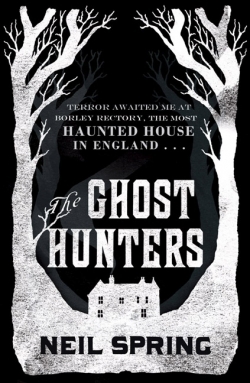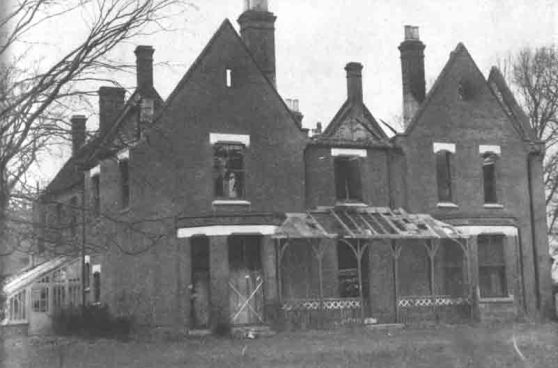My segment on the podcast requires a lot of research this week, so I’m pushing the Campo Santo post back yet again. However, my goal for the rest of the summer is to read 100 pages a day, so I bring you yet another book review!

![]()
![]()
![]()
![]()
![]()
I do love me a good epistolary novel! At 522 pages, this one was still not too long, considering it spans from the late 1920’s to somewhere in the 50’s or 60’s. The pacing was decent, only dragging during a couple of moments throughout and never seeming rushed; a tough feat for stories of this nature. In his Author’s Note, Spring shows his knowledge of the “layered narrative” as”a well-worn technique in the ghost-story genre” (521). I think he executed it well for how difficult it is to mimic classic stories that use this modus operandi.
In fact, what I appreciate most about Ghost Hunters is how evident Spring makes his love for research, history, and deducing the reason for our need of the paranormal through his main character, Sarah Grey. He found this important enough to include the fact that he wrote his thesis on “the significance of paranormal events” in his author bio, which immediately made me warm to him. It’s clear he wants us to understand which bits of the story were taken from real historical events, photographic evidence, and personal correspondence/media and which were fabricated for the purpose of the story. The amount of detail he went into on the subjects of Harry Price and the Borley Rectory case is astounding, and it is worth reading the book for this alone. I did find the writing a bit lacking in some areas (“I melted into his embrace” = not a thing) but marrying creative writing and historical research is hard, people, and I don’t think that should be overlooked.
Sarah Grey was a very interesting character; here, again, we have an unreliable female narrator that is pulled off pretty well by a male author. Though he clearly has his plate full with all the detail, tweaks he’s making to history, and several attempts at plot twists, he doesn’t neglect Sarah’s substance for the rest. I was very frustrated with Sarah for not taking charge of her situation, but I soon came to realize that feeling that way would be totally hypocritical. At one time or another, pretty much all of us have been sucked in by someone who is charming, manipulative, and a total narcissistic liar. So, I remain firm in the opinion that Sarah’s character isn’t a reason to give the story a lesser rating. If you want perfect women, read a Harlequin romance!
While we’re on the subject of gender, I thought that this story was another prime example of frustration over gender roles. We have the staunch, reasonable, masculine “scientist” who wants to prove that ghosts aren’t real, and we have a bunch of females (and one male) with some real power as mediums, or at least with some good common sense intuition. We also have some fake female mediums, and these types believe that a seance should be extra flashy. On one of the spectrum: hyper-masculinity. On the other: hyper-femininity. Feeling like we have to strictly adhere to either one of these extremes when experiencing, interpreting, and influencing the world around us, can lead to ruin. But somewhere in the middle, where we’re able to balance both, lies the sweet spot. I think this story, in its way, highly advocates gender fluidity and shows both the merits and downfalls of what we label as “masculine” and “feminine” behavior. It kind of tells us how important it is for us as humans not to stay solely in one fabricated category, but to be able to travel between the two; and this, in turn, takes away our capacity for prejudice in certain areas. Both the prejudice that ghosts absolutely can’t be real, and the assumption that every scratching noise is a malevolent entity.
For me, the interactions between the characters and trying to interpret the reason for their motives was far more entertaining than trying to predict the plot twists, which, to me, didn’t seem all that revelatory. This is a pretty formulaic ghost story; it’s an age-old tradition and there’s nothing wrong with that, but the consequence for me as a reader was that I had things figured out halfway through the book– which not only made Sarah Grey seem a little nearsighted but also kind of made me wonder what the author thought of his readers’ deduction skills. This is mostly my reason for giving three and a half stars.
As far as the scare-factor goes: nothing was too frightening, but the apparition of the nun did start to creep up on me. Especially post-Conjuring 2. She was reminiscent of one of my favorite ghost stories, Susan Hill’s The Woman in Black. Overall, if you haven’t experienced something like this and you’re into haunted house narratives, I’d recommend giving this one a go.


Price, Harry. The End of Borley Rectory. Harrap & Co., Ltd., 1946. http://www.harrypricewebsite.co.uk/Borley/ModernBorley/modernphotographs.htm.
Is that the, uh, the full-body apparition of a nun in the window? Okay. It’s cool. It’s fine. We’re all fine here. Let’s just move on.
Of course, Borley Rectory is a real place. Or was. You can’t visit it today; it was gutted by fire in 1939 and they tore it down in 1944. This is probably just as well, since in 2000, Louis Mayerling, a frequent visitor to the house until its destruction, published a very aptly-titled book by the name of We Faked the Ghosts of Borley Rectory, exposing the hauntings as a hoax perpetrated and perpetuated by several families over time. However, in keeping with the theme of The Ghost Hunters, Mayerling did experience an event during a seance at the Rectory that he could not explain. So who knows?
As for Harry Price, he too was a real person. I’ll leave out any speculations about his personality and earnestness, partly because that could be a post on its own, and partly because I want you to experience the trust, doubt, anger, and scepticism I did while reading the book without your opinions being colored by any real-life documentation of his character. Spring clears up the line between fact and fiction a bit in his Authors Notes, but in the end, his guess about who Harry Price really was is probably as good as ours. And that is one of the greatest strengths of this novel: its ability to make you believe, doubt, and question in a single breath.